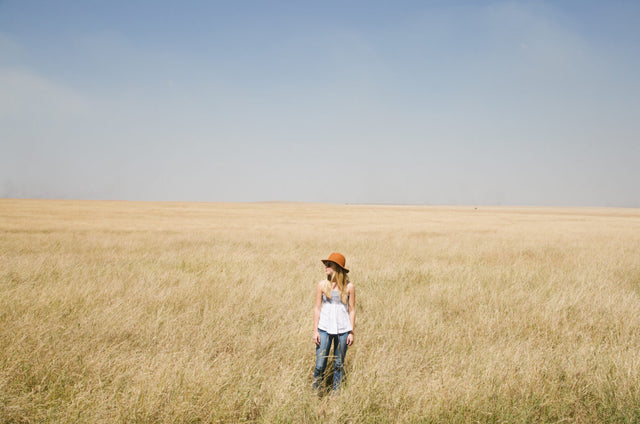Pursuits of Purpose: Courtney Poole of Rose & Fitzgerald

An Interview with Founder of Rose & Fitzgerald, Courtney Poole
Pursuits of Purpose is a series where we feature interviews with people who are on the front lines of creating social value and leading a generation toward a new way of living, acting, and thinking. For past features, click HERE.
As you know, we are also rooted in Uganda, working out of the incredible community of Gulu. What inspired you to live and start a business in Uganda?
In the fall of 2012, my husband and I left our home in San Diego, California and moved to Kampala, Uganda, for his new role at Bridgeway Foundation, which focuses on peacemaking and reconciliation in East and Central Africa. Prior to the move, I had been working at a boutique-advertising firm, and although it was a creative, fast-paced environment, I constantly dreamed about spending my time doing something I was truly passionate about – work that gave me greater purpose and fulfillment. Our move to Uganda was the perfect opportunity for me to start fresh, be open to anything and allow myself to discover my talents, passions and dreams. I spent those beginning days wandering throughout Kampala, which was full of newness and excitement. Very organically, in markets and at small craft stores and boutiques throughout the vast city, I met individual artisans and small business owners that had a true knack for their craft. For the first time in my life, I had the confidence to begin designing products, specifically to decorate my home and compliment my lifestyle. My inspiration came from mixing our coastal roots and design perspective with newfound materials and traditional handiwork. And with every piece I created, each one constructed with unmistakable care and patience by an artisan that worked with me to get each product just right, I began to realize that these pieces were truly something special. That’s when the light bulb went off – I realized that I wanted to share this beautiful part of the world with others who value handmade products from native, natural materials; products created by an artisan truly passionate about their craft. Furthermore, my desire to build relationships in Uganda as well as make a positive impact on the community became a reality when I realized I could offer a sustainable income to artisans, championing them to create high quality products and increase their production capabilities.
What is one thing you wish you would have known when you first started Rose and Fitzgerald?
I wish I would have known that failing, over and over again, is a natural part of the process. When I started Rose & Fitzgerald and our first big orders starting coming in, I would take each setback, production delay, material shortage (really every little problem or error), as a huge personal blow. I would assume that these setbacks or issues were a reflection of my abilities, and that these failures meant that I was a failure. Four years into this business, I now know better. I realize that constant problem solving, changing the original plan, and being highly adaptable is all part of owning and running my own small business. Trying to design and produce unique, high-quality goods in a third-world country is no small feat, and I realize now that being less hard on myself makes the process a lot more enjoyable. As long as I know that our small team is doing the very best we can, I’m able to celebrate our growth and achievements, while learning from and working through the inevitable failures.
You partner with artisans to design and create stunning home goods, jewelry, and more. What are some of the challenges of marrying contemporary designs with more traditional practices?
Honestly speaking, this is one of the most rewarding parts of what we do at Rose & Fitzgerald. We’ve always aimed to preserve traditional methods, materials, and designs, while adding our own contemporary aesthetic in a way that feels natural, not forced. And our employees and artisan partners have been so receptive to our vision. I think the main challenge involved in doing this well, is time. In order to work with an artisan on a new and different vision for an art form that they’ve known to be a certain way for so long, it takes patience and a lot of back and forth collaboration and conversation. It’s not likely that a design, color, shape or size that we had in mind for a product will be perfect on the first-round, and that’s okay. This isn’t a process that’s meant to be rushed, and that’s part of what makes the final products so special and beautiful. Also, creating high-quality goods in Uganda, where many of the local handicrafts are created quickly and cheaply for the local markets, is a challenge. This means we have to really push our artisans to create higher quality products than they might be used to, taking the quality control process very seriously. This also means that we have to allow for more flexible timelines — we stress that we’d rather them work slowly to create something high-quality and beautiful, than to work quickly to create something that isn’t so.
How does the landscape, culture, and / or people of Uganda inspire or inform your aesthetic and products?
Living and working in Uganda for three years created a true love story for my life. My husband and I had the opportunity to travel to far-off, exotic and awe-inspiring places. By returning to nature, living in a foreign land, being constantly challenged and stimulated by new experiences and places, a creative side of myself was unleashed that I never even knew I had, and this has perhaps been my biggest design inspiration. Uganda is incredibly diverse; the different cultures, languages, distinct artistic traditions, religions and landscapes are all so beautifully mysterious to me. In addition to the allure of adventure and travel, Uganda feels very exciting. It’s a place experiencing such rapid growth and change, and I feel this urge to take a part in that. Ugandan artistic traditions absolutely influence and inspire me. The crafts are so rich in meaning and history. There is leatherwork and textiles, wooden figures and carvings, masks, bodily decoration and adornment, elaborative shields and weapons, stone carvings, metalwork… the list goes on and on! The richness of the colors and textures and methodologies for crafting them, inspire me to use these traditions in new and exciting ways.
As an individual that values craftsmanship and impact in the products you rely on, how do you take this mindful approach in your everyday life?
My husband and I take every effort we can to shop with purpose and to fill our home with products that hold meaning and value. Many of the décor items in our home were sourced or made while we lived and traveled throughout Africa. When shopping for clothes or buying gifts, I love supporting brands with an emphasis on handmade or with initiatives like sustainable job creation, empowerment, and the environment. Lastly, I’d say that we live by the motto “WANT BETTER. NOT MORE.” We make a conscious effort to only buy things we truly need, and to keep our space minimal and clutter-free. When we do make purchases, we value quality over anything else.
What’s in the pipeline for Rose & Fitzgerald? Any new products or news coming up?
We recently launched The Found Collection, an ever-evolving, one-of-a-kind line of artifacts from Africa that we’ve personally fallen in love with, collected, and in many cases, carried by hand across borders—and now offer in this thoughtfully curated section of our shop. We’re excited to continue expanding and sourcing for this line of really special goods. In addition, we’ll be adding pieces to our ongoing collection of home goods, which we design ourselves. We love soapstone, a metamorphic rock mined from a quarry in Kenya and hand-chiseled into beautiful, unique goods – and we’ll definitely be adding pieces to that line soon. We’re also adding a few brass and copper barware items to our shop in time for the holidays, perfect for a season of gathering and entertaining with food and drinks.
Lastly, what is your favorite KK intl. product?
It’s way too hard to choose just one! I have a one-year-old son and I’m in so in love with the Little Wolf Beanie made in Uganda! This would be the perfect (and cutest) accessory for him to wear during the colder fall and winter months, and it fits his personality so well. As for myself, I’m obsessed with the Phoenix Open Knit Poncho made in Peru. We live right near the sea, so this is the perfect stylish and casual piece to transition from a sunset walk on the beach to a happy hour with friends. Not to mention, it’s so soft and comfortable, a top priority when it comes to what I wear! 





0 Comments
There are no comments yet. Be the first one to post one!